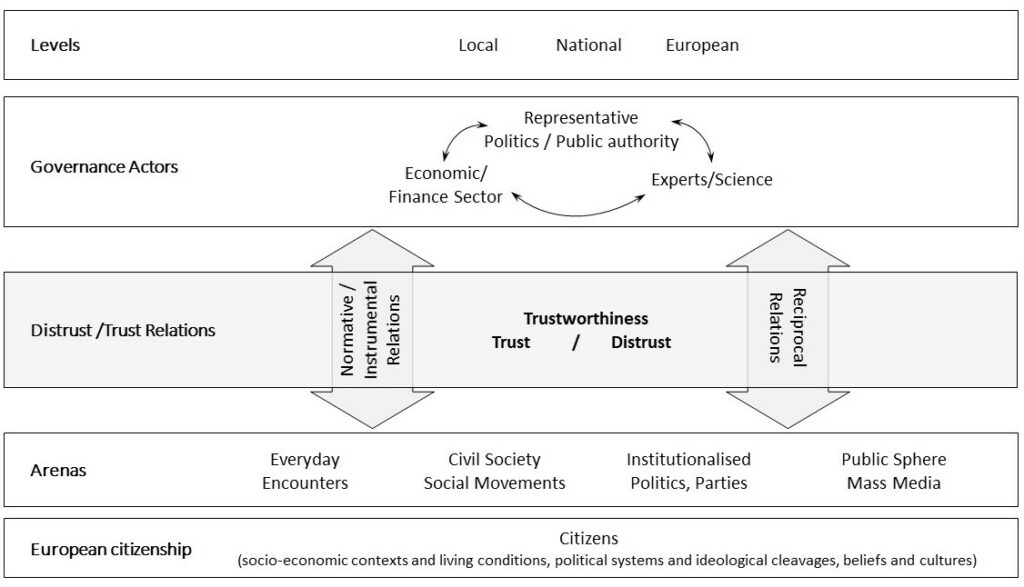Approach
EnTrust is geared to provide in-depth knowledge on the dynamics of trust and distrust in governance, facilitate the identification of viable solutions and enhance ‘enlightened trust’ as a measure to strengthen democratic governance and open society. In order to achieve these goals, the project is based on a multi-disciplinary and multi-methods research design that follows four main ambitions.
Firstly, we aim to provide insights into the intricate relationships between trust and distrust, arguing that the way to counter the threats to democratic governance should not solely reside on promoting unconditional trust, mitigating distrust and/or turning distrust into trust. We should rather reconfigure the balance between trust and distrust and promote forms of ‘enlightened trust’, given that forms of informed and thoughtful trust are characteristic of democratic governance in terms of power sharing, critical citizens and active participation. Therefore, we investigate trust and distrust as distinct, equally relevant and interrelated dimensions patterning the relationships between citizens and various governance actors.
Secondly, the project is geared to presenting theoretical and empirical evidence to show that trust and distrust are collective phenomena that are patterned, reproduced or eroded through reciprocal relations and practices, contestations or negotiations between citizens and various governance actors, implying that the (dis)trustfulness of citizens is co-determined by the (dis)trustfulness of public authorities, and vice versa, and that both sides are co-responsible for remedial actions.
Thirdly, EnTrust engages in a systematic cross-country comparison in order to consider the quite different historical legacies, socio-economic, political and cultural contexts of European countries responsible for quite diverse cultures of trust and distrust (including the Czech Republic, Denmark, Germany, Greece, Italy, Poland and Serbia). These diverse situations and experiences provide an excellent source of data to generate a full understanding of forms, conditions and consequences of trust and distrust in local, national and European governance, and to develop well-balanced and targeted recommendations for remedial action.
Fourthly, EnTrust is designed to identify the determinants of trust and distrust in governance at the individual and contextual levels and their consequences for democracy and society. In particular, we argue that trust and distrust in governance are patterned by socio-economic, political, cultural and psychological factors. To decipher the dynamics of trust and distrust in governance and to design remedial actions, EnTrust has put together a consortium consisting of seven research teams with expertise in the fields of sociology, psychology, political science, media and communication studies, as well as a civil society practitioner active at the EU level.

EnTrust implements its research design by means of a research methodology that combines various data sets:
- a multi-disciplinary reanalysis and synthesis of existing data
- a mapping of new democratic social movements as alternative arenas for creating and reproducing trust and distrust
- interviews and focus groups with citizens, activists and social movement representatives, street-level bureaucrats, policy-makers, media representatives and experts at local, national and/or European level/s
- a representative individual survey among European citizens in the seven countries under analysis
- psychological survey-based experiments with children, youth and adults
- content analyses of national mainstream mass-media, social media and alternative media
- an organisational survey about good practice examples of national and EU institutions’ engagement with citizens and civil society
